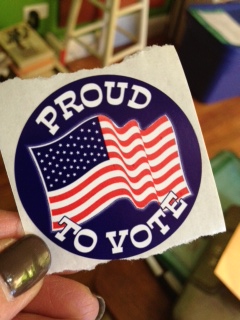 Next week I will vote for the first time in a presidential election. I became a naturalized U.S. citizen two years ago, giving up my Korean passport, my (not)green card, and pledging allegiance after having lived in the U.S. since the spring of 1971.
Next week I will vote for the first time in a presidential election. I became a naturalized U.S. citizen two years ago, giving up my Korean passport, my (not)green card, and pledging allegiance after having lived in the U.S. since the spring of 1971.
I actually studied for my citizenship exam out of fear and habit – fear that the wrong answer would mean restarting a process that had cost money, time and emotions, and habit because I grew understanding not studying was not an option. The process actually took years for me, wrestling through ambivalence, frustration, grief and gain to get to a point where the privileges, advantages and necessities of becoming a citizen and my faith as a Christian pushed me over the edge.
At the heart of my decision wasn’t the right to vote. It was an issue of integrity. As a writer/blogger/speaker who addresses issues of justice, culture, and faith I have a desire to understand and learn from others about policy and politics as it connects with living out my faith as an individual and as a part of a community. But it was one thing to talk about “the issues”, to take a stand, or to share my opinions. It was another thing to consider what responsibilities and privileges I had or could have at my disposal to steward well.
So next week will be my “first time” (I thought Lena Dunham’s ad was funny). This decision hasn’t been an easy one. Neither major party had me at hello. I am tired of my sons being able to repeat the script for multiple political ads. I do not believe Christians must vote with one party over the other.
But I am wondering if other Christians believe that Christian U.S. citizens must vote or should vote as a matter of stewarding the power and privilege they have in a process that impacts those who cannot represent themselves.
Will you be voting? Why or why not?
